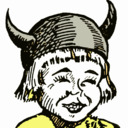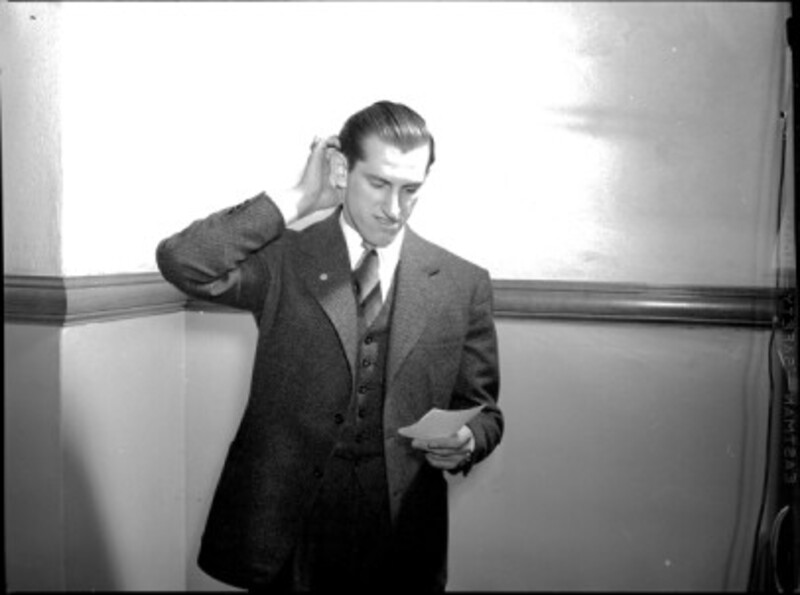When the Freshmen Class of 1943 assembled in the fall of 1939 to elect officers, they were addressed by an enthusiastic young man promoting the virtues of Stanley Wojtkiewicz, who was promptly elected President. The nominator, it turned out, was Mr. Wojtkiewicz, who, grinning widely, always said his name was too hard to pronounce, “Just call me Bow-Wow.” Older than many of the other students at 22, Stanley Thomas Wojtkiewicz of New Kensington, Pennsylvania, a river town near Pittsburgh, failed to turn his early success into a political career. But the events at Idaho did foreshadow his later life.
The editors of the 1940 Gem of the Mountains summarized his one-semester term: “When the kids put Stanley in office they had no idea he would make the usually inert class come to life. He has put on more movements by the freshman class than any president in the last five years. Frosh-sponsored tea dances, toy dances, pep rallies, booster buttons, and many other things have kept them in the notice of the university student body.” Bow-Wow’s brief political career had many positives, but he alienated much of the student body. The Gem pictured him reading an etiquette book, the caption reads: “Bow-Wow taking a much-needed crack at Emily Post;” that “much-needed” an apparent swipe at his activities. The next year, he tried again for president of the Sophomore Class; he received only 37 votes.
An agitator and a prankster, Bow-Wow kept the university in an uproar. While the Argonaut reported on a number of pranks throughout the year, none were ascribed to Bow-Bow, at least not by name. The Argonaut gossip columnist reported that Bow-Wow had filed for a marriage license in southern Idaho over the spring break in 1940 but this may have been just another false alarm.
His reputation made any assertion believable, if only at first. Rafe Gibbs, writing in the campus history Beacon for Mountain and Plain, stated that Bow-Wow once bet the student union building, then called the Blue Bucket, on the WSC-Idaho game. Idaho lost; he paid up with a blue-painted scrub-bucket. The Argonaut, on November 11, 1939, however, had a photo and an article that showed he merely participated in a plan to create a blue bucket traveling trophy between the two schools. In January 1941, a California coroner had telegraphed that Bow-Wow had been killed near Santa Rosa in an auto crash. Suspecting one of his “notorious hoaxes,” the Argonaut editor summarized his college career up to that point: “He was always better than his word,” a sentiment which was certainly recalled when Bow-Wow showed up for class a few days later.
While it is not clear whether he actually finished his sophomore year at Idaho, student affairs returned to normal, except for the fact that there was a war on. Bow-Wow wrote to the Registrar in 1944 asking for information about correspondence courses and reported that the fuel tanker he was serving on had been torpedoed and he had spent 12 days in a lifeboat. Even Gibbs hesitated to question that story.
Although he unsuccessfully turned out for basketball and football at Idaho, Bow-Wow’s interest in sports continued. In 1946/47 he coached basketball and football at a Topeka, Kansas, Catholic high school. He apparently left in the middle of basketball season, perhaps because they were losing games. Soon after, he showed up in Los Angeles, and parlayed his coaching experience, including a stint as coach at a California prison, into a continuing position as field manager at UCLA. Rich Bertolucci, of the UCLA Sports Information Office, retells a story that shows Bow-Wow’s propensity for practical jokes continued undiminished:
Bow Wow once had a coach tossed in jail. The coach’s car was being serviced so Bow Wow loaned him his Cadillac. No sooner did the coach drive off-campus than Bow Wow reported to the police that the Cadillac had been stolen. The police located the car and summoned Bow Wow to identify the vehicle. When he arrived at the station, the police informed Bow Wow that the alleged “thief” claimed to know the car’s owner and that Bow Wow had loaned him the car.
“I never loan my car to anybody,” said Bow Wow.
The police informed Bow Wow that their suspect swore otherwise and was adamant that he had borrowed the car. Bow Wow reluctantly agreed to see the coach.
“Bow Wow!! Bow Wow!!” screamed the coach from behind bars. “Bow Wow! Tell them you loaned me the car!”
“Officer,” said Bow Wow, “This man is barking like a dog. I never saw him before in my life!”
In 1953, Wojtkiewicz became the third husband of Hollywood gossip columnist Sheilah Graham, now well known as F. Scott Fitzgerald’s lover at the time of his death in 1940. Her book, Beloved Infidel, was made into a movie in 1959, starring Gregory Peck as Fitzgerald and Deborah Kerr as Sheilah. Bow-Wow and Sheila had a difficult divorce in 1956, and she, calling him a “pathological liar” – a comment that could also have been made about herself, attempted to erase his memory. Her two children, Robert and Wendy, who both wrote autobiographical accounts of their mother’s life, did not remember this brief marriage fondly. Sheilah referred to Bow-Wow as “an American of Polish ancestry with an unpronounceable name.” Two years later, Sheilah and the two children were photographed on horseback at Sun Valley, then as now playground of the stars.
Aged 80, Bow Wow had a stroke and died in the UCLA Medical Center on Friday, November 7, 1997. In the Social Security records his name is given as Wojciechow I. Wojtkiewicz, born February 1, 1917, died November 15, 1997. Interestingly, he acquired his Social Security card while at Idaho.
Sources
Written July 2005 for the UI Library’s Digital Memories website.


